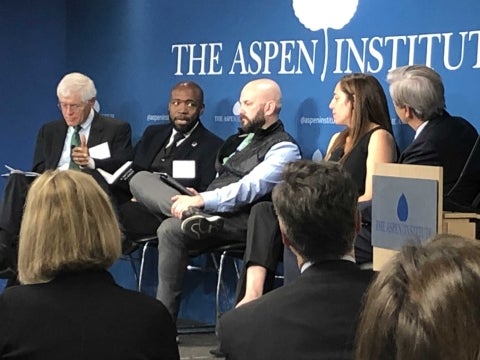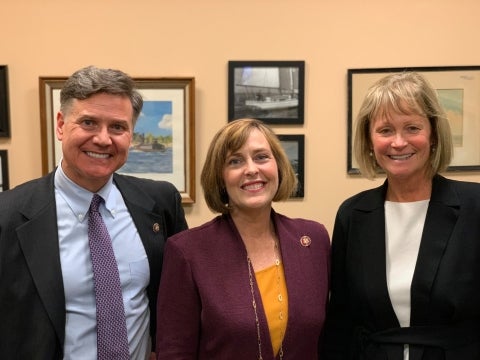Note: Yale School of the Environment (YSE) was formerly known as the Yale School of Forestry & Environmental Studies (F&ES). News articles and events posted prior to July 1, 2020 refer to the School's name at that time.
Many of the environmental crises that captured public attention decades ago — air quality in Los Angeles, pollution in Love Canal, the Cuyahoga River in flames — were local, immediate and discrete. Today’s threats, including climate change and biodiversity loss, are a different matter entirely, Professor Julie Zimmerman told an audience gathered for a Yale Environmental Dialogue (YED) event in Washington, D.C. last week.
Many of today’s environmental threats, she said, are subtle, systemic, and intertwined. But too often, she said, society’s response are fragmented and done in isolation. According to Zimmerman, a professor of green chemistry at F&ES and the Yale School of Engineering & Applied Science, solutions to these challenges require systems thinking — an approach that examines interactions between various components of the system.

“What if we sequester carbon dioxide to address climate change, but then use that carbon dioxide to make fuels and chemicals, mitigating the need for petroleum feedstocks and, in fact, the entire petroleum value chain?” she said. “What if we make chemicals and materials from feedstocks that are considered wastes, realizing the circular economy, eliminating the end-of-life effects, and recovering value while mitigating the need for virgin feedstocks?”
The event, which was co-hosted by The Aspen Institute, also served as the official release of the book, “A Better Planet: 40 Big Ideas for a Sustainable Future,” which was produced by the YED and published by Yale University Press. The initiative — and the book — have brought together dozens of experts (including Zimmerman) from a range of disciplines and perspectives to identify bold ideas that might achieve this.
Fellow panelist Thomas Easley, assistant dean of community and inclusion at F&ES and another contributor to the book, noted that another barrier to finding effective solutions to many environmental threats is the fact that many of the people who are most affected — including in communities of color across the United States — aren’t included in these conversations.
To illustrate the importance Easley described a recent event he coordinated in New Haven which brought together members of the community and Yale students to talk about issues of environmental justice. The conversation that emerged, he said, reflected vastly different experiences and expectations. When the Yale students talked about “air quality,” for instance, it didn’t resonate with the local residents. “In their minds, they’re thinking about survival. ‘I just had a cousin who died last week,’ or ‘I have a grandma who’s struggling with diabetes,’ or ‘I have a baby who’s dealing with asthma.’ All these situations are related but people aren’t talking about them the same way.”
 Before the YED event, Prof. <strong>Daniel Esty</strong> (above, left) addressed members of Congress about bipartisan strategies for environmental protection as part of The Aspent Institute’s Congressional Program. <span style="font-size: 12px;">Afterward, Esty and F&ES Dean <strong>Indy Burke</strong> (above, right) met with lawmakers, including U.S. Rep. <strong>Kathy Castor,</strong> D-Fla., (above, center) chair of the U.S. House Select Committee on the Climate Crisis; U.S. Rep. <strong>Bruce Westerman</strong> ’01 M.F., R-Ark.; and U.S. Rep. <strong>Paul D. Tonko</strong>, D-N.Y., chair of the Environment and Climate Change subcommittee of the Committee on Energy and Commerce. </span>
Before the YED event, Prof. <strong>Daniel Esty</strong> (above, left) addressed members of Congress about bipartisan strategies for environmental protection as part of The Aspent Institute’s Congressional Program. <span style="font-size: 12px;">Afterward, Esty and F&ES Dean <strong>Indy Burke</strong> (above, right) met with lawmakers, including U.S. Rep. <strong>Kathy Castor,</strong> D-Fla., (above, center) chair of the U.S. House Select Committee on the Climate Crisis; U.S. Rep. <strong>Bruce Westerman</strong> ’01 M.F., R-Ark.; and U.S. Rep. <strong>Paul D. Tonko</strong>, D-N.Y., chair of the Environment and Climate Change subcommittee of the Committee on Energy and Commerce. </span>
Also, if community leaders and policymakers take a closer look at why some communities are historically left out of the conversation, he said, they might identify institutional or structural systems that are creating these barriers — sometimes intentionally.
“If the people who are going to be most impacted are not in the room, it’s a problem,” Easley said. “Maybe they have ideas around solutions we can implement. Because they also can speak better to what they’re dealing with.”
Easley and Zimmerman were joined on the panel by two other contributors to “A Better Planet,”
Derry Allen, formerly of the U.S. Environmental Protection Agency, and
Greg Gershuny, who leads the Energy and Environment Program at The Aspen Institute. Allen made the case that the nation’s “environmental protection enterprise” — the network of public and private organizations and individuals focused on sustainability-related goals — must achieve a more focused approach built on shared principles and goals. Gershuny, meanwhile, discussed strategies by which the farming community and food supply chain — from growers to consumers — can more sustainably steward the land.
The Washington event was the latest in a series of national events hosted by Yale as part of the YED initiative to promote important discussions on environmental issues. Upcoming events will be held in Houston, Chicago, and San Francisco.
Learn more about the Yale Environmental Dialogue.

 Before the YED event, Prof. <strong>Daniel Esty</strong> (above, left) addressed members of Congress about bipartisan strategies for environmental protection as part of The Aspent Institute’s Congressional Program. <span style="font-size: 12px;">Afterward, Esty and F&ES Dean <strong>Indy Burke</strong> (above, right) met with lawmakers, including U.S. Rep. <strong>Kathy Castor,</strong> D-Fla., (above, center) chair of the U.S. House Select Committee on the Climate Crisis; U.S. Rep. <strong>Bruce Westerman</strong> ’01 M.F., R-Ark.; and U.S. Rep. <strong>Paul D. Tonko</strong>, D-N.Y., chair of the Environment and Climate Change subcommittee of the Committee on Energy and Commerce. </span>
Before the YED event, Prof. <strong>Daniel Esty</strong> (above, left) addressed members of Congress about bipartisan strategies for environmental protection as part of The Aspent Institute’s Congressional Program. <span style="font-size: 12px;">Afterward, Esty and F&ES Dean <strong>Indy Burke</strong> (above, right) met with lawmakers, including U.S. Rep. <strong>Kathy Castor,</strong> D-Fla., (above, center) chair of the U.S. House Select Committee on the Climate Crisis; U.S. Rep. <strong>Bruce Westerman</strong> ’01 M.F., R-Ark.; and U.S. Rep. <strong>Paul D. Tonko</strong>, D-N.Y., chair of the Environment and Climate Change subcommittee of the Committee on Energy and Commerce. </span>